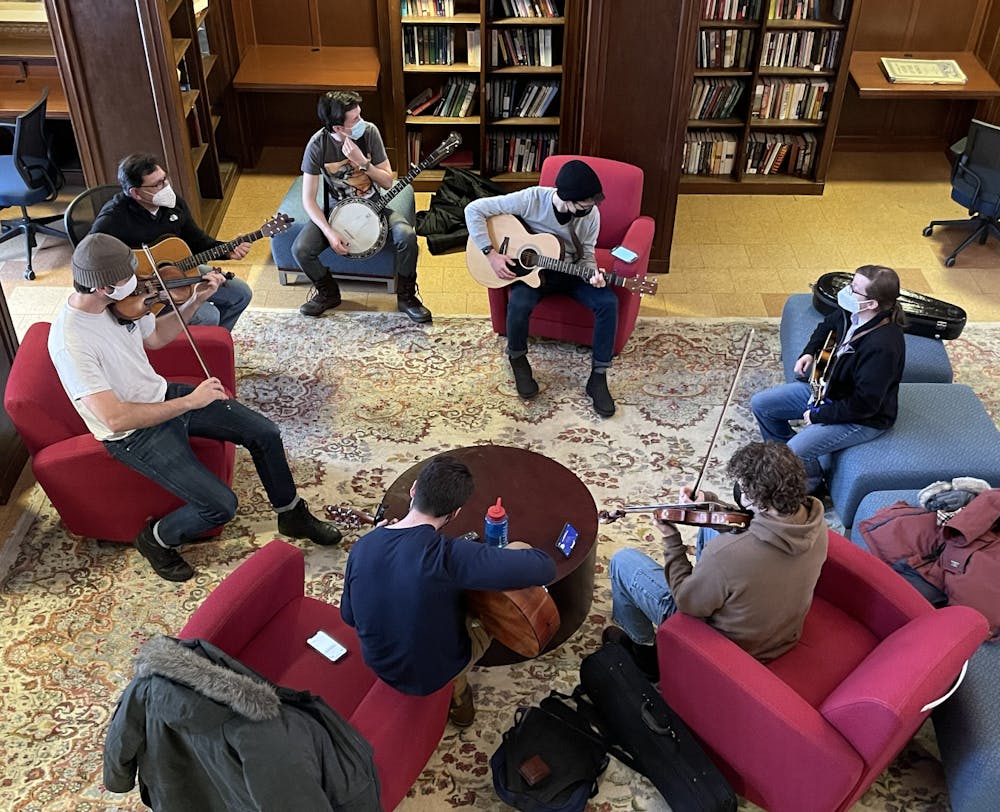While the “Feb identity” has rightly been deconstructed in recent years, there are still some Febs who wear the tropes well. Lee Summers ’24.5 is one such quintessential Feb. He plays rugby and studies Ancient Greek at Middlebury. He resides in Houston (and will let you know it), and he picked up a quirky new hobby over his Febmester: bluegrass.
When Summers picked up bluegrass music as a pastime during his gap semester last fall, he came to campus prepared to answer the infamous “What’d you do during your febmester?” question with style. Despite looking through numerous online forums, he came up short of finding any active bluegrass communities in the Middlebury area.
Fast forward a few weeks, and Summers is writing a paper on Book III of Plato’s Republic for Intro to Political Philosophy. Socrates explains what types of music the guardians of his just city should listen to. Summers tried to make a case that Socrates would have liked bluegrass music, breaking it down by modes and scales. Whether he demonstrated mastery over ancient Greek music theory is debatable, but what resulted from this paper was an offer from Postdoctoral Fellow Daniel Fram — who taught the class — to play bluegrass with him.
When Fram was in college, he participated in a faculty-led lunchtime jam session. “It was something that had been on my mind since I got here,” Fram said. Summers and Fram started jamming outdoors in the spring. Assistant Professor of Economics Amanda Gregg was eager to join, and the group slowly started growing. “It felt like a little snowball we started,” Fram said. Sam Chester ’22, who had been looking for a bluegrass community all four years of college, saw the group jamming outside, and the snowball effect continued.
One of the unique aspects about bluegrass is the emphasis on listening to the other musicians playing, using their playing as inspiration for improvisation.
“You learn how to listen better and look for those little themes that might develop in the music, and how you can push them a bit with your own instrument,” Vice President for Communications and Marketing David Gibson, another member of the group, said.
Summers describes this same phenomenon but extrapolates it to the group as a whole. Listening to the tension between instruments in order to create a unified sound in turn creates a more unified group. “The democratic idiom of bluegrass, in a way, forces you to relate to people that seem just really awe-inspiring or unapproachable in class as peers,” Summers said.
The four members of the group who spoke to The Campus commented on the improvisation that distinctly categorizes bluegrass music. Students like Summers are able to learn a lot from more experienced faculty and staff. “There’s all sorts of trade. I’ve stolen more licks [short musical phrases] from David, Dan and Amanda than I can count,” Summers said.
On the flip side, this group provides an exciting opportunity for the adult members of the group to learn from the students as well. Fram describes the bluegrass jams as not unlike what he experiences in his seminars at the college. “We have some experts holding it down, but, as what often happens in the classroom, faculty and staff can learn from the students too,” Fram said.
It is rewarding for Gibson that these jam sessions draw such a diverse group of Middlebury College members.
“To be able to do that with people I either don’t have much opportunity to interact with or connect with only through the job, makes it even more enjoyable,” he said.
Not only is the ensemble music style itself “give and take” but so is the learning atmosphere in the group — which touts a wide range of experience. More than jazz, bluegrass is uniquely approachable, where the layered melodies range from simple to more complex, all the while flowing seamlessly. In other words, the range of skill and experience can be broad within one group of bluegrass musicians, but playing can still be enjoyable.
Gregg spoke to the joy in teaching and learning in a positive environment like this.
“I'm an economist, not a music professor, so helping new members learn the basics so they can get involved has required me to teach outside my comfort zone,” Gregg said. “If you want to make everything else in your life seem a lot less scary, singing a song in front of other people usually does the trick.”
The link between learning life lessons and playing music might not seem obvious at first glance, but it exists. Whether one realizes this academically, by reading Plato’s Republic, or experientially, by jamming with Middlebury’s bluegrass group, people constantly express attitudes towards life — attitudes about the fear of death, love, longing, and loss.
Fram took a philosophical approach to the influence of music more broadly.
“Music is indeed a profound way to express what life is all about,” he said.
The Middlebury Bluegrass Jam convenes Fridays at 4:30pm.
For more information, contact Lee at bluegrass@middlebury.edu




